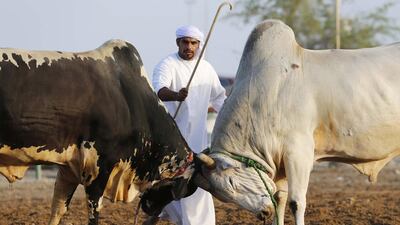FUJAIRAH // An emphasis on the emirate’s historical and cultural attractions, and a greater number of Emiratis employed in the industry, would help to boost tourism in Fujairah, experts have said.
Known for its rugged mountains and pristine beaches, the east coast emirate is already a popular choice as a stay-at-home destination for visitors from across the UAE, as well as package deal tourists from further afield.
However, more could be done to boost visitor numbers, said Simon Mead, operations manager with tour operator Arabian Adventures.
“Fujairah is a great beach destination and offers popular ocean activities like scuba diving and snorkelling, but it is more of a special-interest destination than other emirates. Many UAE residents are already aware of Fujairah being a quick beach escape, but more needs to be done to highlight what other offerings visitors can experience there.”
Authorities in the emirate were working on creating a heritage village to showcase the cultural side of the area, said Mr Mead.
“Many people don’t realise that the UAE’s oldest mosque, Al Badiyah Mosque, is located in Fujairah. Promoting options like these will help build the emirate’s reputation as a go-to destination for visitors. It’s a collective responsibility to highlight these options for visitors. I believe more can be done to highlight Fujairah’s range of activities, including those of cultural and historical interest.”
Patrick Antaki, general manager of Le Meridien hotel at Al Aqah beach, said events such as the weekly bull-butting contest on the Corniche could be more structured and organised to be an attraction in itself.
The sport is a throwback to the time when the Portuguese were in this part of the region and involves two animals pushing against each other until one is forced out of a circle.
“It’s very folkloric but very cool to see it,” said Mr Antaki. “As a tourist, it can be a bit overwhelming and even seem cruel if you don’t understand it, as it’s definitely not a cruel sport, but it could be much better organised and with access to Emiratis who can explain this part of the culture for themselves.
“It’s a place to see lots of colour and local folk, but it needs to be structured more. There could be a whole industry built around it. We need Emiratis to tell these stories.”
Efforts by the higher colleges of technology to encourage young Emiratis to join the industry have yielded mixed results in recent years. In 2009 and 2010, intakes of both men and women were offered internships with hotels to try and promote the growing industry.
“I would love to get it going again,” said Mr Antaki. “Everyone has to embrace this. Hotels are only going to increase. Locals will want jobs in the hospitality sector. ”
Frank Eikeland, general manager of the Radisson Blu resort, agreed that working with educational institutions was key to promoting the industry among Emiratis.
Hiring more locals has been a priority for him since he joined the hotel three months ago.
“We will be visiting institutions as I want to make sure we have this connection, to show the young generation what the industry is about. Many don’t even know about it,” he said. “They need to be exposed to it and see how much potential there is.”
Emiratisation, Mr Antaki said, was vital for the industry. “We have to have them on our payroll. Having locals involved gives the experience here that cultural objectivity and authenticity. Tourists want to get to know locals, get to meet them, it’s a huge part of travelling. Being greeted by an Emirati and meeting people living the local culture would connect me as a tourist.”
mswan@thenational.ae

